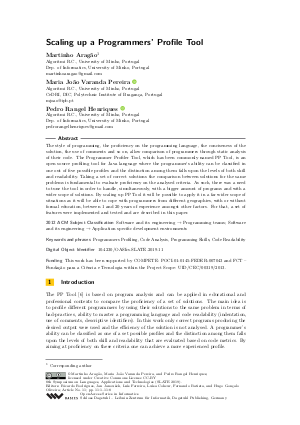Scaling up a Programmers' Profile Tool
Authors
Martinho Aragão,
Maria João Varanda Pereira  ,
Pedro Rangel Henriques
,
Pedro Rangel Henriques 
-
Part of:
Volume:
8th Symposium on Languages, Applications and Technologies (SLATE 2019)
Part of: Series: Open Access Series in Informatics (OASIcs)
Part of: Conference: Symposium on Languages, Applications and Technologies (SLATE) - License:
 Creative Commons Attribution 3.0 Unported license
Creative Commons Attribution 3.0 Unported license
- Publication Date: 2019-07-24
File

PDF
OASIcs.SLATE.2019.11.pdf
- Filesize: 0.5 MB
- 8 pages
Document Identifiers
Subject Classification
ACM Subject Classification
- Software and its engineering → Programming teams
- Software and its engineering → Application specific development environments
Keywords
- Programmers Profiling
- Code Analysis
- Programming Skills
- Code Readability
Metrics
- Access Statistics
-
Total Accesses (updated on a weekly basis)
0Document
0Metadata
Abstract
The style of programming, the proficiency on the programming language, the conciseness of the solution, the use of comments and so on, allow comparison of programmers through static analysis of their code. The Programmer Profiler Tool, which has been commonly named PP Tool, is an open source profiling tool for Java language where the programmer’s ability can be classified in one out of five possible profiles and the distinction among them falls upon the levels of both skill and readability. Taking a set of correct solutions the comparison between solutions for the same problems is fundamental to evaluate proficiency on the analysed criteria. As such, there was a need to tune the tool in order to handle, simultaneously, with a bigger amount of programs and with a wider scope of solutions. By scaling up PP Tool it will be possible to apply it in a far wider scope of situations as it will be able to cope with programmers from different geographies, with or without formal education, between 1 and 20 years of experience amongst other factors. For that, a set of features were implemented and tested and are described in this paper.
Cite As Get BibTex
Martinho Aragão, Maria João Varanda Pereira, and Pedro Rangel Henriques. Scaling up a Programmers' Profile Tool. In 8th Symposium on Languages, Applications and Technologies (SLATE 2019). Open Access Series in Informatics (OASIcs), Volume 74, pp. 11:1-11:8, Schloss Dagstuhl – Leibniz-Zentrum für Informatik (2019)
https://doi.org/10.4230/OASIcs.SLATE.2019.11
BibTex
@InProceedings{aragao_et_al:OASIcs.SLATE.2019.11,
author = {Arag\~{a}o, Martinho and Pereira, Maria Jo\~{a}o Varanda and Henriques, Pedro Rangel},
title = {{Scaling up a Programmers' Profile Tool}},
booktitle = {8th Symposium on Languages, Applications and Technologies (SLATE 2019)},
pages = {11:1--11:8},
series = {Open Access Series in Informatics (OASIcs)},
ISBN = {978-3-95977-114-6},
ISSN = {2190-6807},
year = {2019},
volume = {74},
editor = {Rodrigues, Ricardo and Janou\v{s}ek, Jan and Ferreira, Lu{\'\i}s and Coheur, Lu{\'\i}sa and Batista, Fernando and Gon\c{c}alo Oliveira, Hugo},
publisher = {Schloss Dagstuhl -- Leibniz-Zentrum f{\"u}r Informatik},
address = {Dagstuhl, Germany},
URL = {https://drops.dagstuhl.de/entities/document/10.4230/OASIcs.SLATE.2019.11},
URN = {urn:nbn:de:0030-drops-108781},
doi = {10.4230/OASIcs.SLATE.2019.11},
annote = {Keywords: Programmers Profiling, Code Analysis, Programming Skills, Code Readability}
}
Author Details
- Algoritmi R.C., University of Minho, Portugal
- Dep. of Informatics, University of Minho, Portugal
- Algoritmi R.C., University of Minho, Portugal
- CeDRI, DIC, Polytechnic Institute of Bragança, Portugal
Funding
This work has been supported by COMPETE: POCI-01-0145-FEDER-007043 and FCT – Fundação para a Ciência e Tecnologia within the Project Scope: UID/CEC/00319/2013.
References
-
T Flowers, Curtis Carver, and J Jackson. Empowering students and building confidence in novice programmers through Gauntlet. 34th Annual Frontiers in Education, pages T3H/10-T3H/13 Vol. 1, November 2004.

-
Markus Fuchs and Christian Wolff. Improving programming education through gameful, formative feedback. 2016 IEEE Global Engineering Education Conference (EDUCON), pages 860-867, 2016.

-
Maria Hristova, Ananya Misra, Megan Rutter, and Rebecca Mercuri. Identifying and correcting Java programming errors for introductory computer science students. ACM SIGCSE Bulletin, 35(1):153-156, 2003.

- Weizhi Huang, Wenkai Mo, Beijun Shen, Yu Yang, and Ning Li. Automatically Modeling Developer Programming Ability and Interest Across Software Communities. International Journal of Software Engineering and Knowledge Engineering, 26(09n10):1493-1510, 2016. URL: http://dx.doi.org/10.1142/S0218194016400143.
- Daniel Novais, Maria Joao Varanda Pereira, and Pedro Rangel Henriques. Program analysis for Clustering Programmers' Profile. In M. Ganzha, L. Maciaszek, and M. Paprzycki, editors, Proceedings of the 2017 Federated Conference on Computer Science and Information Systems (FedCSIS), pages 701-705. PTI; IEEE, 2017. FedCSIS, Prague, Czech Republic, Sep 03-06, 2017. URL: http://dx.doi.org/10.15439/2017F147.
-
Daniel José Ferreira Novais. Programmer profiling through code analysis. Master’s thesis, University of Minho, December 2016.

-
Emília Pietriková and Sergej Chodarev. Profile-driven Source Code Exploration. Computer Science and Information Systems (FedCSIS), pp. 929-934, IEEE., 2015.

-
Nghi Truong, Paul Roe, and Peter Bancroft. Static analysis of students' Java programs. In Proceedings of the Sixth Australasian Conference on Computing Education-Volume 30, pages 317-325. Australian Computer Society, Inc., 2004.

